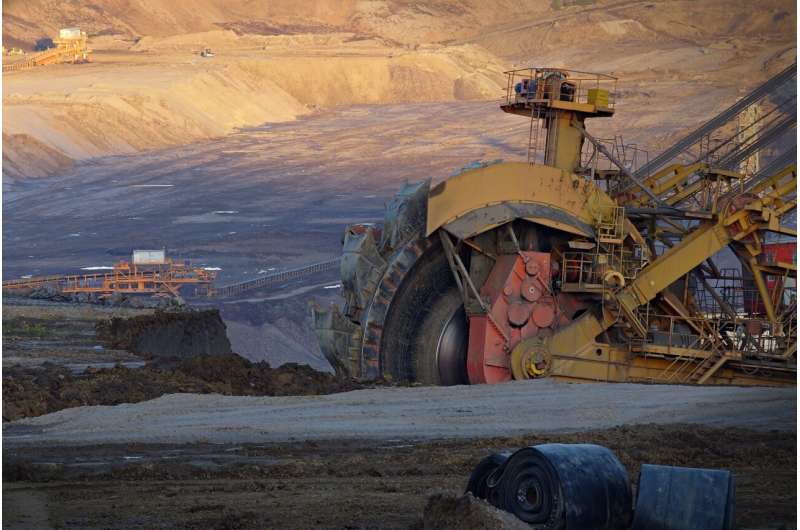This article has been reviewed according to Science X's editorial process and policies. Editors have highlighted the following attributes while ensuring the content's credibility:
fact-checked
trusted source
written by researcher(s)
proofread
Feeling depleted? So is the planet. Here's how to move from exhaustion to empowerment

Have you felt overwhelmed recently? Stressed and exhausted from the busy treadmill of modern life? You're not alone. Global polls suggest 76% of people experience burnout at least sometimes at work.
Earth is utterly exhausted too, or so political theorist and author Ajay Singh Chaudhary argues. As an environmental scientist who documents the loss of wildlife, threat of pollution and dwindling global resources, I agree.
In his recently published book, The Exhausted of the Earth, Chaudhary proposes this burnout is an inevitable consequence of the capitalist system. Citing socialist influences from Karl Marx to Walter Benjamin, he builds the case for how capitalism treats workers as disposable, just as it destroys global resources—such as soils, mines and forests—exhausting one location before moving onto the next.
Chaudhary correctly argues the climate crisis, at its heart, is a people problem. Yet, many policymakers propose it can be solved simply by new technology and green economic growth alone—Chaudary calls this wishful thinking "technomysticism".
My own experience in environmental policy confirms how we need to go beyond the idea of quick technological fixes, such as putting giant mirrors in space to reflect sunlight—something that would have huge side effects. Instead, we need to change our relationship to each other and nature.
Chaudhary suggests a major hindrance is that we are certainly not all in this together, despite the common rhetoric. Climate change is a consequence of an exhausting form of capitalism that also generates inequality— there's a growing mass of oppressed people who have no upside to the climate crisis besides becoming more exploited and more impacted. They are "the exhausted".
Chaudhary's polemic encourages these people to rise up. He recognizes the difficulty though, because of the resilience of our capitalist system. Resilience is often seen as a good thing, but I know from my own work there are forms of "undesirable resilience", such as unsustainable global food systems that are responsible for more than a quarter of all greenhouse gas emissions as well as destroying biodiversity. Once established, it can be very difficult to disrupt an entire complex system from that status quo because so many aspects are interlinked and reliant on each other.
Chaudhary is correct, I believe, when he describes how attempts to build resilience (by securing the supply chains of major corporations, for example) can perpetuate an unfair and unsustainable status quo. He suggests there's a set of people with vested interests who actually benefit from climate chaos and don't want things to change. For some people, crises pay.
An elite subset of the population became vastly richer after the COVID-19 crisis. He describes how one third of the wealth accrued to US billionaires since 1990 was accumulated in 2020 alone. This elite also stands to benefit from climate change—for example, from the boom in private security firms and increasing resource prices.
According to Chaudary, these "right wing climate realists" understand the seriousness of climate change but simply don't want to solve it. This is based on the rational, yet selfish, logic that derailing the current socially- and ecologically-destructive capitalist system would lead to losing personal wealth.
The cost of phasing out fossil fuels globally is between US$16-200 trillion (£12-16 trillion). He argues that the whole capitalist system, which hinges on accelerating exhaustion and inequality, could not survive such climate solutions that don't support continued economic growth.
Instead, the global elite protect themselves from climate breakdown, while further accelerating the climate crisis through their actions. The top 10% of people emit half of all global CO₂ emissions.
Our current capitalist system certainly needs to be transformed, as even the conservative Intergovernmental Panel on Climate Change increasingly asserts. Though, it is here that I'm less confident of Chaudhary's approach.
"My hope is that you recognize yourself along the extractive circuit, among the Exhausted ….. And that you pass your story of exhaustion onto others who will share theirs," he writes.
To me, this framing may be self-defeating. Creating a sense of exhaustion can backfire and lead to less action on climate. Perhaps Chaudhary means to incite the anger of the mob. History shows this can be effective, but can also lead to replacement of one powerful elite with another, as communism and the French Revolution demonstrated.
From exhaustion to empowerment
If we are exhausted, as Chaudhary suggests, what are the narratives that enable regeneration? People often feel powerless asking "what can I do as an individual to tackle global climate change?" The knot in this question is in that word individual.
My own book The Self Delusion describes how we are more than individuals. Our actions are contagious across social networks—every word and touch shapes the minds of those around us. Numerous findings in biology and neuroscience show how we are deeply connected to each other and with other species on this planet.
We are all in this together. This interconnectedness engenders a sense of both individual and collective responsibility as well as agency.
We can move from exhaustion to motivation and empowerment to become a driving force for change by combining resources and transforming the systems we are part of. We can work together to ensure our households, local community and the other species around us are adapted to climate change.
Rise up, energize others and work as a collective to address the climate crisis. Don't feel exhausted.
Provided by The Conversation
This article is republished from The Conversation under a Creative Commons license. Read the original article.![]()



















